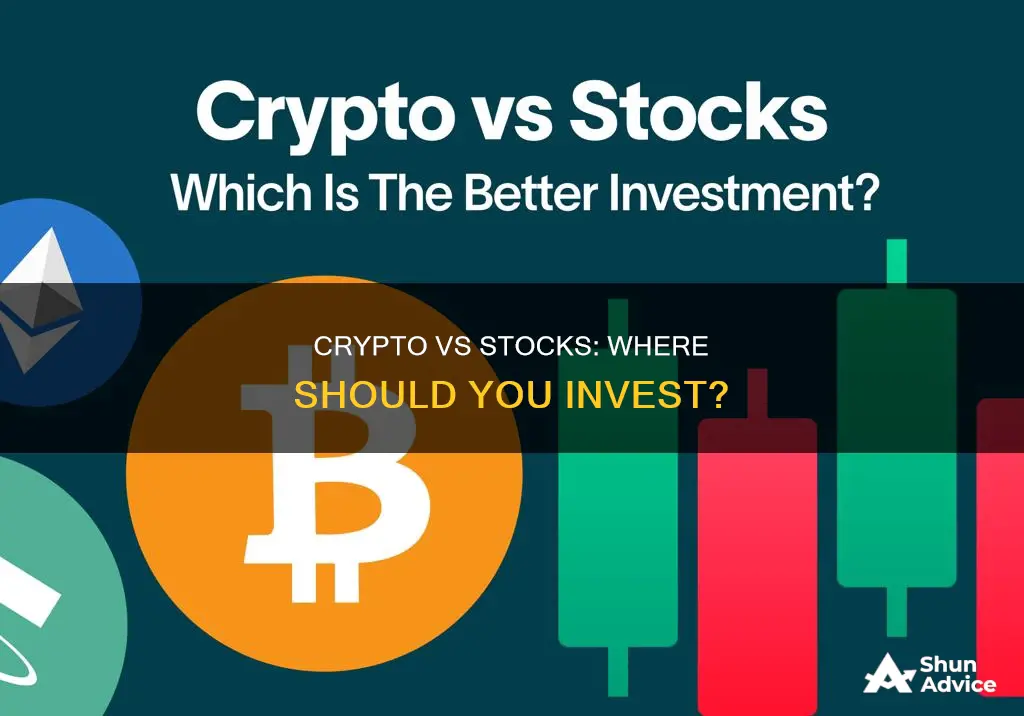
The emergence of cryptocurrencies has sparked a debate about whether they are a better investment option than stocks. Both have their pros and cons, and the choice depends on an individual's financial goals, risk tolerance, and understanding of each asset class. Stocks are fractional ownership interests in a business, backed by the company's assets and cash flow, while cryptocurrencies are digital or virtual currencies using cryptography for security. Cryptocurrencies have a low barrier to entry, are highly liquid, and operate independently of centralized banks, but they lack thorough regulation, have a history of volatility, and are not widely accepted as payment. Stocks, on the other hand, have a long history of solid returns, are more regulated, and are backed by tangible assets, but they are also subject to high taxation and require specialized knowledge.
| Characteristics | Values |
|---|---|
| Accessibility | Cryptocurrency has a low barrier to entry, as it can be accessed by anyone with an internet connection, regardless of age or income. Stocks are also easily accessible, with many online brokers offering zero trading fees. |
| Volatility | Cryptocurrency is highly volatile, with prices fluctuating wildly due to its speculative nature and lack of underlying assets. Stocks are generally less volatile, but can still experience significant price swings due to market downturns, poor management, or shifts in industry trends. |
| Returns | Cryptocurrency offers the potential for high returns, with some coins experiencing rapid and substantial increases in value. Stocks typically offer lower returns, with the S&P 500 index returning about 10% over the long term. |
| Risk | Cryptocurrency is considered riskier than stocks due to its high volatility, lack of regulatory oversight, and newness. Stocks are generally considered safer, but are still subject to market risks and company-specific issues. |
| Regulation | Cryptocurrency is largely unregulated, with varying global approaches. Stocks are highly regulated, with established exchanges and strict requirements for financial disclosure. |
| Ownership | Cryptocurrency is a digital asset with no physical form. Stocks represent fractional ownership of a company, entitling shareholders to a claim on the company's assets and profits. |
| Value | The value of cryptocurrency is driven by market speculation and demand-supply dynamics. The value of stocks is tied to the financial performance of the underlying company, with investors assessing the company's future success. |
| Diversification | Cryptocurrency offers exposure to digital economic sectors such as video gaming, decentralized finance, and Web3 entities. Stocks provide diversification across various traditional economic sectors, including industrial, real estate, and retail. |
| Acceptance | Cryptocurrency is not widely accepted as a form of payment, with only a few countries accepting Bitcoin. Stocks are a well-established and widely accepted form of investment, with a long history of market exposure. |
What You'll Learn

Crypto vs. stocks value
The main difference between crypto and stocks is that crypto is a digital asset, while stocks represent fractional ownership of a business. Stocks are a well-established, traditional investment option, whereas crypto is a newer, more innovative and unpredictable option.
The value of a stock is tied to the performance of the company. As a legal ownership stake in the business, the stock gives shareholders a claim on the assets and cash flow of the business. These back your investment and provide a basis for its valuation. Stocks have a long history of solid returns and are less volatile than crypto.
The value of a cryptocurrency is driven by speculation and market demand. The market value of a cryptocurrency comes down to supply and demand. The value of a cryptocurrency may eventually have qualities similar to stocks if and when people start using them in real-world transactions. For now, there is no intrinsic value to crypto, and it is not backed by hard assets or earnings.
The long-term value of crypto is yet to be seen, and it is difficult to say whether it possesses any real long-term value. However, in the short term, crypto can offer substantial returns on investments, outpacing more traditional asset classes.
Doge Coin Investment: Worthwhile or Risky Business?
You may want to see also

Crypto vs. stocks governance
Governance refers to the processes by which an entity is controlled, including its hierarchy, operations, and systems. In the context of investing, governance structures dictate how decisions are made and by whom.
Governance in Stocks
In the world of stocks, governance is typically more established and straightforward. Stocks represent fractional ownership of shares in a company, and stockholders often have voting rights that allow them to exert control over the company's direction. For example, shareholders can elect a Board of Directors to oversee major transactions and ensure that executives act in the company's best interests. This structure provides accountability and protects investor interests.
Governance in Crypto
Governance in the crypto space is more complex and varied. Cryptocurrencies are decentralised and lack the centralised authority structures commonly found in traditional equity markets. However, this does not mean that crypto investors are entirely without influence. Crypto investors can lend or stake their tokens for passive income and, in some cases, participate in governance through voting mechanisms.
One example of crypto governance is the use of governance tokens, which are cryptocurrencies that grant holders the right to participate in on-chain governance for a specific project. These tokens allow holders to vote on various aspects of the project, such as treasury allocation, upgrades, and interest rates. Governance tokens provide a degree of decentralisation and community collaboration, allowing stakeholders to have a say in the project's future.
However, crypto governance is not without its challenges. The lack of centralised authority can make it difficult to hold individuals accountable for poor governance decisions, especially with the anonymity associated with crypto voting. Additionally, the influence of large token holders or "whales" can disproportionately impact the direction of a project.
When comparing crypto and stocks governance, it's important to consider the level of centralisation, accountability, and investor influence. While stocks have more established governance structures, crypto offers a decentralised approach that empowers investors through voting mechanisms. However, the challenges of anonymity and the potential dominance of large token holders must be addressed to ensure fair and effective crypto governance. Ultimately, investors should carefully consider the governance regime of any crypto project before investing, as it can significantly impact their holdings.
Bitcoin for Everyone? Exploring Average Joe's Investment
You may want to see also

Trading crypto vs. stocks
The basic process of buying cryptocurrencies is similar to buying stocks. You open an account with a crypto brokerage, transfer funds, select a cryptocurrency, and place an order. However, there are some key differences in the trading experience between crypto and stocks.
Trading Fees
Crypto brokers typically charge trading fees for each transaction, while most stock brokers have eliminated this practice. For example, the popular Coinbase platform charges a transaction fee of 0.6% on crypto purchases below $10,000.
Transaction Speed
Stock transactions are extremely fast, with algorithmic trading systems capable of executing trades in microseconds. In contrast, crypto trades are slower due to the need for blockchain network approval and verification. Ethereum trades typically take around 15 seconds, while Bitcoin trades can take several minutes.
Custody of Assets
With stocks, your broker usually acts as the custodian of your holdings. In the case of cryptocurrencies, some investors prefer to take custody of their digital coins by storing them in a cold wallet under their own possession rather than on a centrally managed brokerage platform.
Volatility and Risk Factors
Cryptocurrencies are highly volatile, exhibiting wild price fluctuations driven by speculative trading and investor sentiment. This volatility offers the potential for high returns but also carries significant risk. Stocks, on the other hand, are generally less volatile and are tied to corporate earnings and financial reports, making them less prone to drastic price swings.
Regulatory Oversight
The stock market is heavily regulated by government bodies, providing a level of protection for investors. In contrast, the cryptocurrency market is largely unregulated, with varying global regulations. This lack of standardised regulation increases the risk of fraud or manipulation in the crypto space.
Trading Hours
Crypto markets are accessible 24/7, allowing traders to buy and sell at any time without traditional market or bank restrictions. Stock markets, on the other hand, typically operate during regular business hours on weekdays.
Worldcoin: The Next Big Crypto Investment Opportunity?
You may want to see also

Crypto advantages vs. stocks
There are several advantages to investing in crypto over stocks. Here are some key points to consider:
- Low Barrier to Entry: Crypto has a low barrier to entry, meaning anyone with internet access can buy, sell, and trade cryptocurrency. There are no income requirements or legal barriers, such as citizenship or age restrictions.
- High Liquidity: Cryptocurrency is a highly liquid asset, allowing investors to exchange it for fiat currencies 24/7 without limits on the number of transactions.
- Decentralization: Crypto operates independently of centralized banks, giving investors sole responsibility for their digital assets and the freedom to store them online or offline.
- Potential for High Returns: Crypto coins can skyrocket in value, and investors hope to be among the first to put money into the next big thing. While this is risky, the potential for large gains is attractive.
- Enhanced Privacy: Cryptocurrency transactions offer privacy and security through pseudonymous transactions. While wallets can be traced to an identity, the transactions themselves do not include specific information about the user.
- Accessibility: Crypto exchanges are accessible 24/7, allowing investors to react to news and market changes outside of traditional market hours.
- Fractional Purchasing: With crypto exchanges, investors can buy fractions of coins, allowing for more flexibility in investment amounts and easier portfolio diversification.
- Direct-to-Investor: Crypto exchanges deal directly with retail investors, reducing the number of intermediaries in the value chain and simplifying the investment process.
- Variable and Transparent Fees: Crypto exchanges typically have transparent and low fees, which are easily understandable and comparable.
While these advantages make crypto an attractive investment option, it's important to remember that investing in crypto also comes with significant risks, including high volatility, cybersecurity threats, and regulatory uncertainties.
Gold Coin Investment: American Anniversary Edition
You may want to see also

Crypto disadvantages vs. stocks
The lack of regulation in the crypto market adds a level of risk that makes many investors wary. Until governments introduce comprehensive regulations, institutional investors are unlikely to enter the market.
The slow transaction times of crypto can also be an issue for traders. The speed of crypto trades is dependent on the digital currency’s blockchain network, which can take several minutes to approve and verify new transactions.
The security of cryptocurrencies is also a concern. There have been instances of crypto exchanges being hacked, and investors losing their assets. Additionally, there is the risk of losing access to your crypto if you forget the password to your wallet.
The extreme volatility of cryptocurrencies is another disadvantage when compared to stocks. Crypto prices are determined by the whims of traders and are not backed by any assets or earnings, making them highly unpredictable.
Best Platforms for Crypto Investment: Where to Invest?
You may want to see also
Frequently asked questions
Crypto is a digital asset, while stocks represent fractional ownership of a business. Stocks are also highly regulated, operating through established stock exchanges, while cryptocurrencies have varied global regulation.
Stocks have a long history of solid returns and are easily accessible to investors. They are also less volatile than cryptocurrencies and are tied to the financial performance of a company. However, stocks may be subject to high taxation and require specialised knowledge.
Crypto has a low barrier to entry, is highly liquid, and operates independently of centralised banks. It also has the potential for large gains. However, it is extremely volatile, is not widely accepted as a payment method, and lacks thorough regulation.
Stocks are generally considered to be safer due to their long history of market exposure and the regulations that govern them. However, this does not make investors immune to stock market crashes or other risks.







